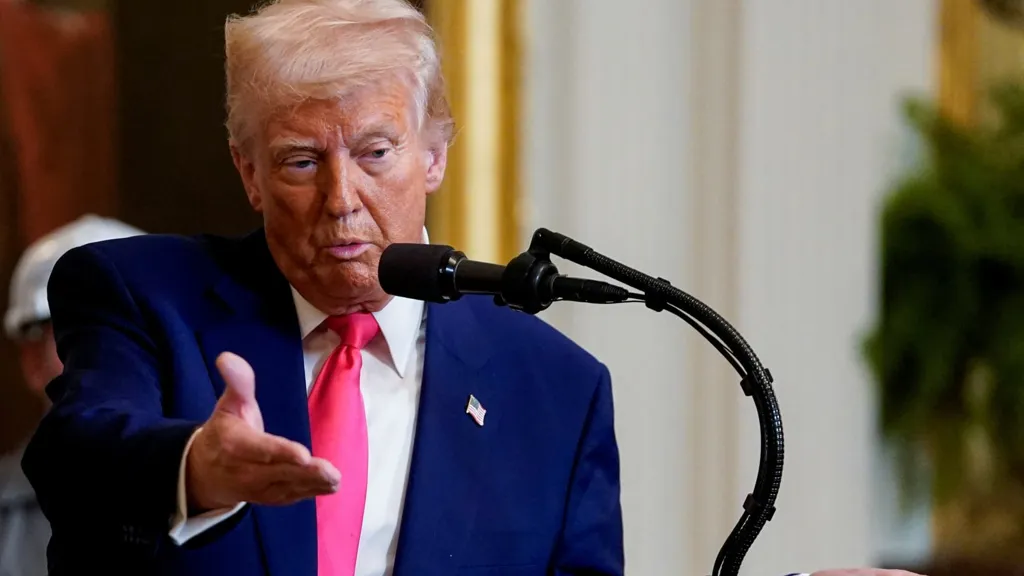Trump himself acknowledged that markets were acting "yippy" ahead of the policy switch.
Issues causing the jump in yields were multi-pronged but all related to dislocations brought on by the swiftest three-day rise in Treasury yields since 2001.
Among them were the unwinding of a popular trade that involves swapping floating-rate products such as Treasurys for a futures product, say the Federal Reserve's Secured Overnight Financing Rate.
Traders look to pocket the difference between the rates in what is known as the "basis swaps" trade. When Treasury yields rise, that tends to close the gap and reduce profit opportunities or cause losses. The situation is complicated when hedge funds use leverage for the trades, leading to margin calls and the need for quick cash, which is often obtained by selling government debt.
"Right now, the unwinding of the basis swaps trade is the primary reason, but not the sole source, of the increase in yields across the Treasury curve," Brusuelas said. Funds "are having to raise prodigious quantities of cash that results in the selling of Treasurys."
There are still more potential reasons for the bond unwind.
They stem from the clumsy April 2 rollout, with the hefty duties applied using a formula that has raised questions less about the general need for tariffs and more about the method in which they are being applied.
At the same time, the precarious fiscal situation in the U.S. adds to investor angst as the budget deficit careens on a pace to exceed $2 trillion this year. On top of that, there are growing signs of stagflation, with economists across Wall Street knocking down estimates for growth while raising inflation forecasts.
"That's no joke," Brusuelas said. "When something like that happens, you're going to get a significant increase in financial stress. Until that abates, we have to assume that there are going to be further issues."
One of the more intriguing reasons also cited for the bond market sell-off is the administration's efforts to knock down the trade deficit of roughly $800 billion deficit.
While the goal in reducing the deficit is to open up the market for U.S. goods and services, it also has a knock-on effect that can affect bond yields.
When the U.S. is taking in a lower level of goods from other countries, that means it is circulating fewer dollars. That in turn means less cash to buy Treasurys, with the lower demand driving up the yield that investors demand. At the same time, there are questions rising about a buyers' strike and the potential for China to offload some of the $760 billion it is holding in U.S. debt.
"Japan and China, two of the largest holders of [Treasurys], have been scaling back their demand in recent years," Meghan Swiber, U.S. rates director at Bank of America, said in a note to clients. "Tariffs and the prospect of a shrinking US trade deficit may mount foreign selling pressures medium term. However, foreign investors are unlikely the only seller driving recent price action."
Amid the ever-burgeoning U.S. debt load, other countries have gradually increased their holdings of Treasurys over the past year.
However, the two biggest creditors, Japan and China, have cut back on their holdings by about $100 billion -- a small chunk of the $8.5 trillion in total held by foreign nations but a move in the wrong direction.
While the stock market gets all the headlines, cracks in the bond market, which is far larger than its equity counterpart, can be much more mean meaningful. Bonds have been acting up since September 2024, when the Federal Reserve enacted a half percentage point interest rate cut despite signs of stubborn inflation. Instead of falling rates surged following the Fed cut, indicating further misgivings about policy.
"The bond vigilantes don't like what monetary policy is doing and they certainly don't like what Trump is doing on the trade side," Yardeni said. "They had something to brag about yesterday with the stock market,but you can't say the same thing with the bond market.Bonds are still acting twitchy."
